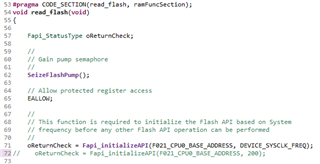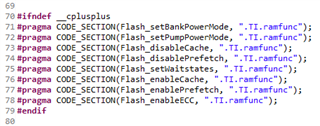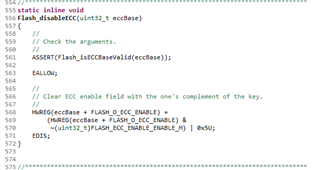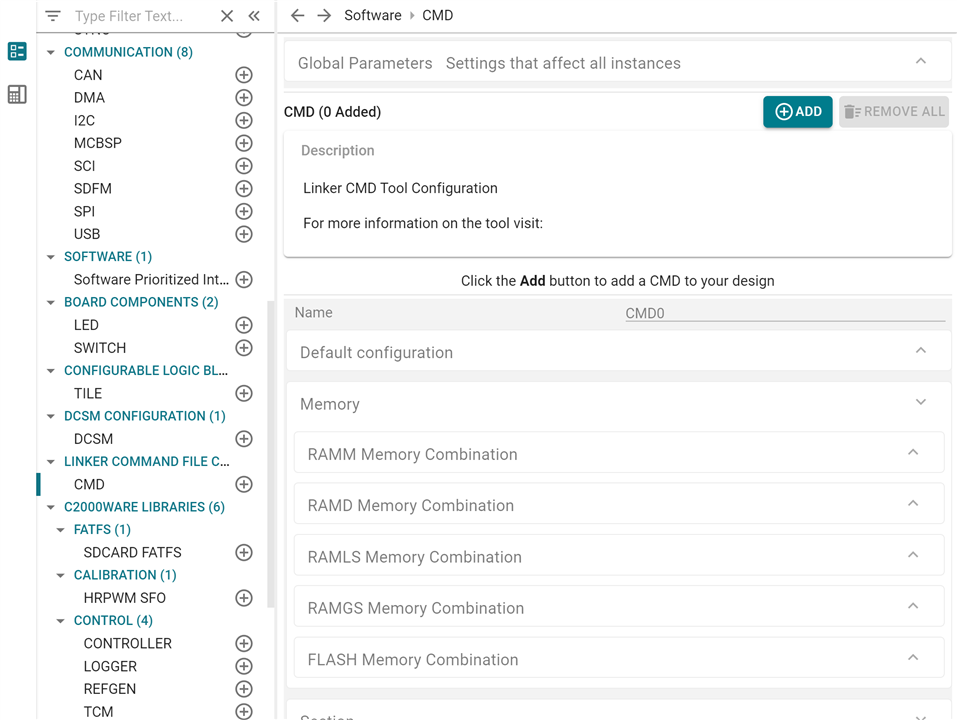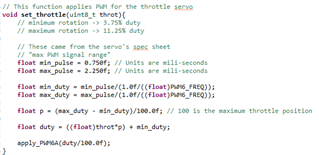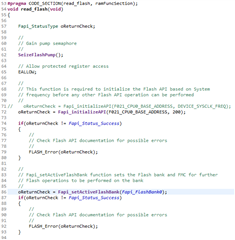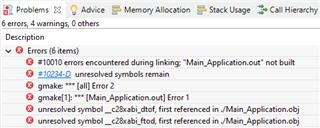Other Parts Discussed in Thread: C2000WARE
Hello experts,
I am having a problem when I debug my program. When I run the program I get the following error:

It says there is no source available for _system_post_cint(). What is that?
The program counter is halted at address 0x3FE493 as shown here:

The address 0x3FE493 is part of the CPU1 to CPU2 MSGRAM according to the Memory Map shown here:
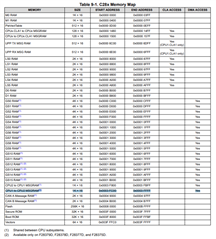
I have also updated the linker .cmd file because my program didn't fit in available memory. I have also increased the heap size from the default 0x400 to 0x800 and the stack size from the default 0x400 to 0x800 as shown here because I was getting warnings saying to increase them:
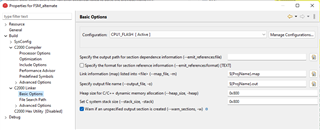
But my program has been crashing recently and I don't know why. I know which C function makes it crash. Actually, when I comment out a certain function, the program crashes. But if I leave that function in the code, it runs successfully. Did I corrupt something accidentally by adjusting the linker .cmd file? I am also using the Flash API to store variables to non-volatile memory. I really need some advice on this.
Here is my linker file:
MEMORY
{
PAGE 0 : /* Program Memory */
/* Memory (RAM/FLASH) blocks can be moved to PAGE1 for data allocation */
/* BEGIN is used for the "boot to Flash" bootloader mode */
BEGIN : origin = 0x080000, length = 0x000002
RAMLS0 : origin = 0x008000, length = 0x000800
RAMLS3 : origin = 0x009800, length = 0x000800
RAMLS4 : origin = 0x00A000, length = 0x000800
RAMGS14 : origin = 0x01A000, length = 0x001000 /* Only Available on F28379D, F28377D, F28375D devices. Remove line on other devices. */
RAMGS15 : origin = 0x01B000, length = 0x000FF8 /* Only Available on F28379D, F28377D, F28375D devices. Remove line on other devices. */
// RAMGS15_RSVD : origin = 0x01BFF8, length = 0x000008 /* Reserve and do not use for code as per the errata advisory "Memory: Prefetching Beyond Valid Memory" */
RESET : origin = 0x3FFFC0, length = 0x000002
/* Flash sectors */
FLASHA : origin = 0x080002, length = 0x001FFE /* on-chip Flash */
FLASHB : origin = 0x082000, length = 0x002000 /* on-chip Flash */
FLASHC : origin = 0x084000, length = 0x002000 /* on-chip Flash */
FLASHD : origin = 0x086000, length = 0x002000 /* on-chip Flash */
FLASHE : origin = 0x088000, length = 0x008000 /* on-chip Flash */
FLASHF : origin = 0x090000, length = 0x008000 /* on-chip Flash */
FLASHG : origin = 0x098000, length = 0x008000 /* on-chip Flash */
FLASHH : origin = 0x0A0000, length = 0x008000 /* on-chip Flash */
FLASHI : origin = 0x0A8000, length = 0x008000 /* on-chip Flash */
FLASHJ : origin = 0x0B0000, length = 0x008000 /* on-chip Flash */
FLASHK : origin = 0x0B8000, length = 0x002000 /* on-chip Flash */
FLASHL : origin = 0x0BA000, length = 0x002000 /* on-chip Flash */
FLASHM : origin = 0x0BC000, length = 0x002000 /* on-chip Flash */
FLASHN : origin = 0x0BE000, length = 0x001FF0 /* on-chip Flash */
// FLASHN_RSVD : origin = 0x0BFFF0, length = 0x000010 /* Reserve and do not use for code as per the errata advisory "Memory: Prefetching Beyond Valid Memory" */
PAGE 1 : /* Data Memory */
/* Memory (RAM/FLASH) blocks can be moved to PAGE0 for program allocation */
BOOT_RSVD : origin = 0x000002, length = 0x000121 /* Part of M0, BOOT rom will use this for stack */
RAMM0 : origin = 0x000123, length = 0x0002DD
RAMM1 : origin = 0x000400, length = 0x0003F8 /* on-chip RAM block M1 */
// RAMM1_RSVD : origin = 0x0007F8, length = 0x000008 /* Reserve and do not use for code as per the errata advisory "Memory: Prefetching Beyond Valid Memory" */
RAMD0 : origin = 0x00B000, length = 0x000800
RAMD1 : origin = 0x00B800, length = 0x000800
RAMLS1 : origin = 0x008800, length = 0x000800
RAMLS2 : origin = 0x009000, length = 0x000800
RAMLS5 : origin = 0x00A800, length = 0x000800
RAMGS0 : origin = 0x00C000, length = 0x001000
RAMGS1 : origin = 0x00D000, length = 0x001000
RAMGS2 : origin = 0x00E000, length = 0x001000
RAMGS3 : origin = 0x00F000, length = 0x001000
RAMGS4 : origin = 0x010000, length = 0x001000
RAMGS5 : origin = 0x011000, length = 0x001000
RAMGS6 : origin = 0x012000, length = 0x001000
RAMGS7 : origin = 0x013000, length = 0x001000
RAMGS8 : origin = 0x014000, length = 0x001000
RAMGS9 : origin = 0x015000, length = 0x001000
RAMGS10 : origin = 0x016000, length = 0x001000
// RAMGS11 : origin = 0x017000, length = 0x000FF8 /* Uncomment for F28374D, F28376D devices */
// RAMGS11_RSVD : origin = 0x017FF8, length = 0x000008 /* Reserve and do not use for code as per the errata advisory "Memory: Prefetching Beyond Valid Memory" */
RAMGS11 : origin = 0x017000, length = 0x001000 /* Only Available on F28379D, F28377D, F28375D devices. Remove line on other devices. */
RAMGS12 : origin = 0x018000, length = 0x001000 /* Only Available on F28379D, F28377D, F28375D devices. Remove line on other devices. */
RAMGS13 : origin = 0x019000, length = 0x001000 /* Only Available on F28379D, F28377D, F28375D devices. Remove line on other devices. */
CPU2TOCPU1RAM : origin = 0x03F800, length = 0x000400
CPU1TOCPU2RAM : origin = 0x03FC00, length = 0x000400
}
SECTIONS
{
/* Allocate program areas: */
.cinit : > FLASHB | FLASHG PAGE = 0, ALIGN(8) // Added by MJT 6/16/2022
// .cinit : > FLASHB PAGE = 0, ALIGN(8)
.text : >> FLASHB | FLASHC | FLASHD | FLASHE PAGE = 0, ALIGN(8)
codestart : > BEGIN PAGE = 0, ALIGN(8)
/* Allocate uninitalized data sections: */
.stack : > RAMM1 | RAMM0 | RAMD0 PAGE = 1
.switch : > FLASHB PAGE = 0, ALIGN(8)
.reset : > RESET, PAGE = 0, TYPE = DSECT /* not used, */
#if defined(__TI_EABI__)
.init_array : > FLASHB, PAGE = 0, ALIGN(8)
// .bss : > RAMLS5, PAGE = 1
.bss : >> RAMLS5 | RAMLS1, PAGE = 1 // Added by MJT 8/11/2022
.bss:output : > RAMLS3, PAGE = 0
.bss:cio : > RAMLS5, PAGE = 1
.data : > RAMLS5 | RAMLS1 | RAMLS2, PAGE = 1
.sysmem : > RAMLS5, PAGE = 1
/* Initalized sections go in Flash */
.const : > FLASHF, PAGE = 0, ALIGN(8)
#else
.pinit : > FLASHB, PAGE = 0, ALIGN(8)
.ebss : >> RAMLS5 | RAMLS1, PAGE = 1
.esysmem : > RAMLS5, PAGE = 1
.cio : > RAMLS5, PAGE = 1
/* Initalized sections go in Flash */
.econst : >> FLASHF PAGE = 0, ALIGN(8)
#endif
Filter_RegsFile : > RAMGS0, PAGE = 1
SHARERAMGS0 : > RAMGS0, PAGE = 1
SHARERAMGS1 : > RAMGS1, PAGE = 1
SHARERAMGS2 : > RAMGS2, PAGE = 1
ramgs0 : > RAMGS0, PAGE = 1
ramgs1 : > RAMGS1, PAGE = 1
#ifdef __TI_COMPILER_VERSION__
#if __TI_COMPILER_VERSION__ >= 15009000
#if defined(__TI_EABI__)
.TI.ramfunc : {} LOAD = FLASHD,
RUN = RAMLS0,
LOAD_START(RamfuncsLoadStart),
LOAD_SIZE(RamfuncsLoadSize),
LOAD_END(RamfuncsLoadEnd),
RUN_START(RamfuncsRunStart),
RUN_SIZE(RamfuncsRunSize),
RUN_END(RamfuncsRunEnd),
PAGE = 0, ALIGN(8)
#else
.TI.ramfunc : {} LOAD = FLASHD,
RUN = RAMLS0,
LOAD_START(_RamfuncsLoadStart),
LOAD_SIZE(_RamfuncsLoadSize),
LOAD_END(_RamfuncsLoadEnd),
RUN_START(_RamfuncsRunStart),
RUN_SIZE(_RamfuncsRunSize),
RUN_END(_RamfuncsRunEnd),
PAGE = 0, ALIGN(8)
#endif
#else
ramfuncs : LOAD = FLASHD,
RUN = RAMLS0,
LOAD_START(_RamfuncsLoadStart),
LOAD_SIZE(_RamfuncsLoadSize),
LOAD_END(_RamfuncsLoadEnd),
RUN_START(_RamfuncsRunStart),
RUN_SIZE(_RamfuncsRunSize),
RUN_END(_RamfuncsRunEnd),
PAGE = 0, ALIGN(8)
#endif
#endif
/* Flash Programming Buffer */
BufferDataSection : > RAMD1, PAGE = 1, ALIGN(8)
/* The following section definitions are required when using the IPC API Drivers */
GROUP : > CPU1TOCPU2RAM, PAGE = 1
{
PUTBUFFER
PUTWRITEIDX
GETREADIDX
}
GROUP : > CPU2TOCPU1RAM, PAGE = 1
{
GETBUFFER : TYPE = DSECT
GETWRITEIDX : TYPE = DSECT
PUTREADIDX : TYPE = DSECT
}
/* The following section definition are for SDFM examples */
// Filter1_RegsFile : > RAMGS1, PAGE = 1, fill=0x1111
// Filter2_RegsFile : > RAMGS2, PAGE = 1, fill=0x2222
// Filter3_RegsFile : > RAMGS3, PAGE = 1, fill=0x3333
// Filter4_RegsFile : > RAMGS4, PAGE = 1, fill=0x4444
// Difference_RegsFile : > RAMGS5, PAGE = 1, fill=0x3333
// Commented out by MJT 8/11/2022
// Added by MJT 8/11/2022
AnalogSubsysRegsFile : > RAMGS0, PAGE = 1, fill=0x1111
ClkCfgRegsFile : > RAMGS0 | RAMGS3, PAGE = 1, fill=0x1111
CpuSysRegsFile : > RAMGS0 | RAMGS3, PAGE = 1, fill=0x1111
CpuTimer0RegsFile : > RAMGS0, PAGE = 1, fill=0x1111
CpuTimer1RegsFile : > RAMGS0 | RAMGS3, PAGE = 1, fill=0x1111
CpuTimer2RegsFile : > RAMGS0 | RAMGS3, PAGE = 1, fill=0x1111
DcsmZ1RegsFile : > RAMGS1, PAGE = 1, fill=0x1111
DcsmZ2RegsFile : > RAMGS1, PAGE = 1, fill=0x1111
DevCfgRegsFile : > RAMGS0 | RAMGS3, PAGE = 1, fill=0x1111
Flash0CtrlRegsFile : > RAMGS0 | RAMGS3, PAGE = 1, fill=0x1111
Flash0EccRegsFile : > RAMGS0 | RAMGS3, PAGE = 1, fill=0x1111
FlashPumpSemaphoreRegsFile : > RAMGS0 | RAMGS3, PAGE = 1, fill=0x1111
GpioCtrlRegsFile : > RAMGS0 | RAMGS3, PAGE = 1, fill=0x1111
GpioDataRegsFile : > RAMGS0 | RAMGS3, PAGE = 1, fill=0x1111
InputXbarRegsFile : > RAMGS1, PAGE = 1, fill=0x1111
PieCtrlRegsFile : > RAMGS1, PAGE = 1, fill=0x1111
PieVectTableFile : > RAMGS0, PAGE = 1, fill=0x1111
SpibRegsFile : > RAMGS0, PAGE = 1, fill=0x1111
WdRegsFile : > RAMGS0 | RAMGS3, PAGE = 1, fill=0x1111
}
/*
//===========================================================================
// End of file.
//===========================================================================
*/
Thanks,
- Matthew






